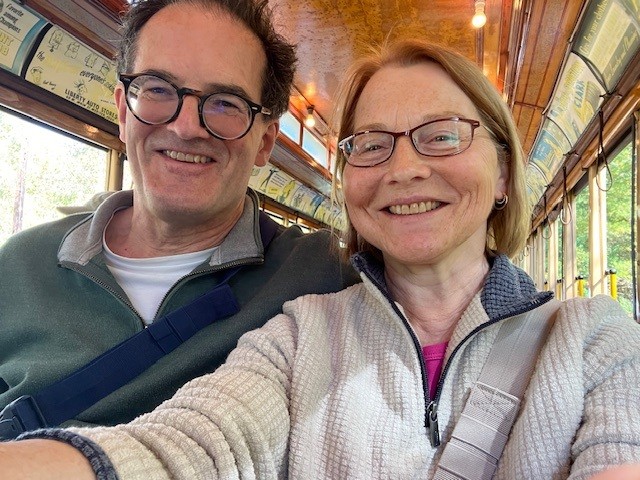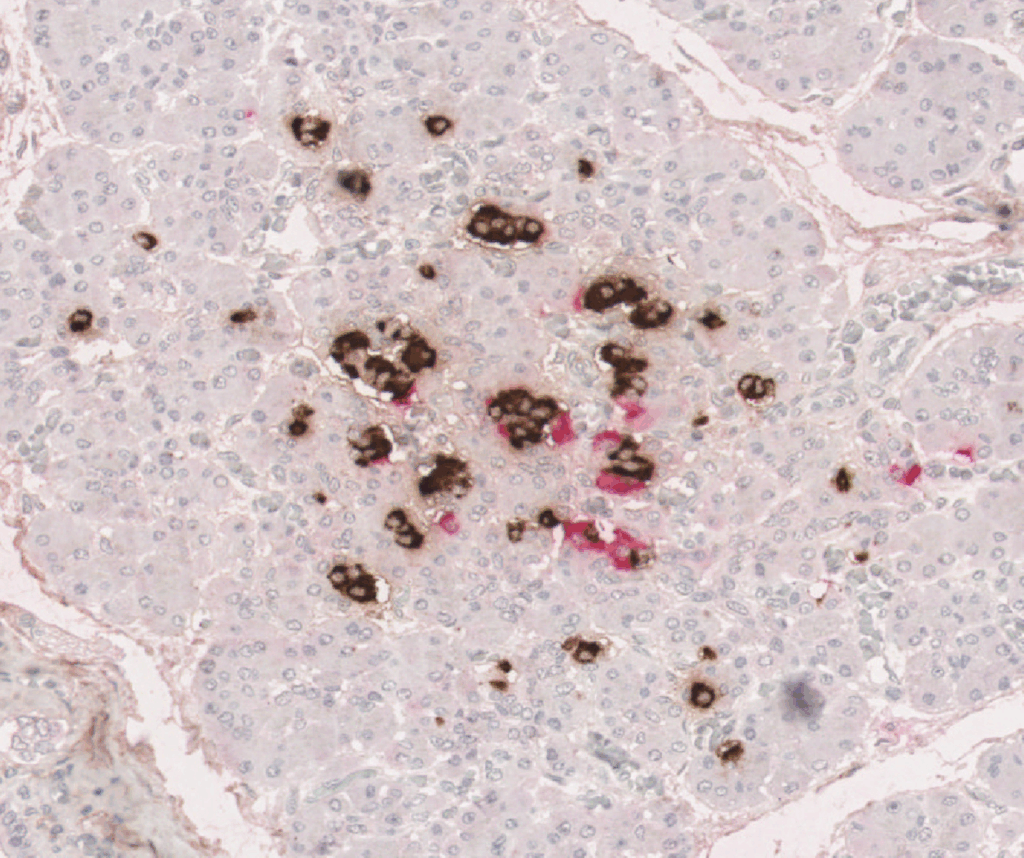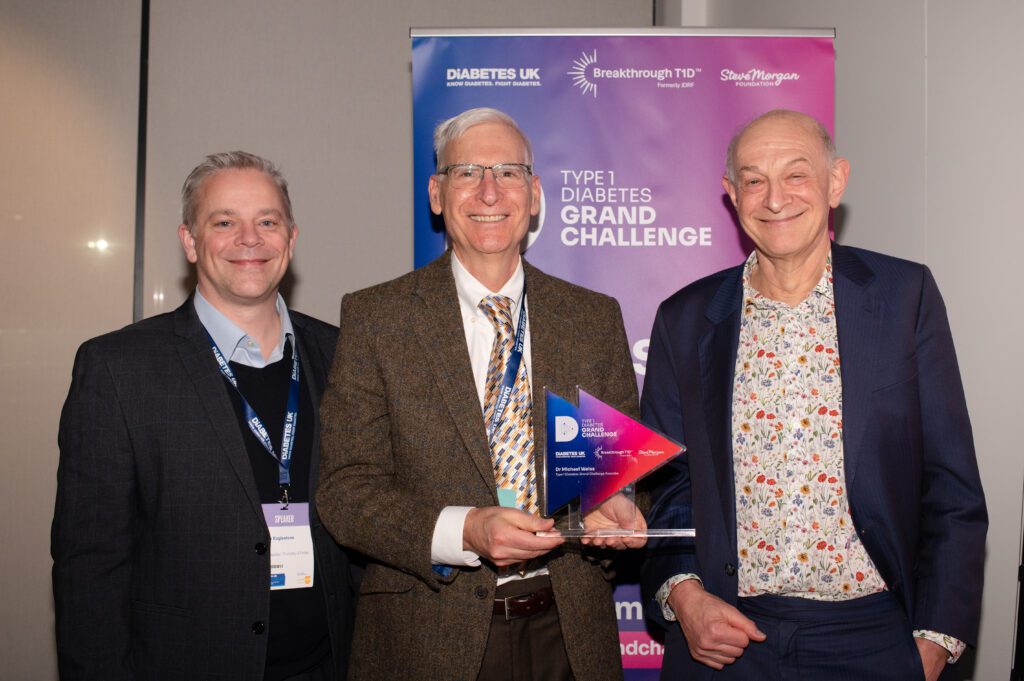
Professor Sarah Richardson and her team have made a major breakthrough in understanding why type 1 diabetes is more aggressive in young children, revealing that nearly all their insulin-producing beta cells are destroyed before they can mature. The new insights could pave the way for new strategies to prevent or delay type 1 diabetes and, in time, contribute to a cure.
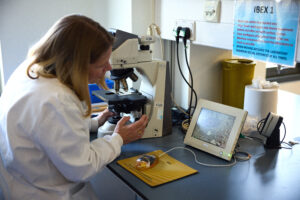
Professor Sarah Richardson, looking at islet samples through a microscope in her lab.
We know that type 1 diabetes is an autoimmune condition, where the immune system attacks and destroys the beta cells in the pancreas. In young children, typically under the age of 7, the immune attack and its destruction of beta cells typically progress rapidly. This can increase the likelihood of diabetic ketoacidosis at diagnosis and make the condition particularly difficult to manage.
Until now, scientists had limited tools to study the early development of beta cells, which are found in clusters in the pancreas. In young children, these clusters are small and still forming, and only contain a few beta cells.
In their latest study published in Science Advances, Professor Richardson and her team used cutting-edge scientific techniques to study these small clusters in unprecedented detail. They analysed rare pancreas samples from over 250 people of varying ages, both with and without type 1 diabetes. They looked at how these clusters change as we age and how they are affected by the immune system.

Teifion Luckett from Sarah’s team, looking at data for their research
The findings confirm that in early childhood, people without type 1 diabetes have many small clusters of beta cells, which normally increase in size and mature with age, with the most rapid development occurring in the first few years of life.
For the first time, our Grand Challenge researchers showed that in people with type 1 diabetes these small clusters are almost completely absent, having been destroyed by the immune system. While some people with type 1 diabetes retained a few large clusters, allowing them to produce small amounts of their own insulin, this was not the case for those diagnosed at a young age.
Together, the results suggest that the abundant small clusters found in young children are especially vulnerable to the type 1 diabetes immune attack. Their rapid destruction prevents them from maturing, leaving very few beta cells later in life. This explains why children diagnosed with type 1 diabetes at a young age typically are unable to produce any of their own insulin, making the condition particularly difficult to manage.
This research underscores the critical role of these small clusters in healthy pancreas development and opens the door for new treatments to protect children’s small clusters of beta cells, giving them the chance to mature into large clusters that are less vulnerable to the immune attack. It also strengthens the case for early type 1 diabetes screening – particularly in young children – essential for identifying those in the early stages of type 1 diabetes before these crucial cells are lost.
Professor Sarah Richardson said:
“These tiny insulin-producing beta cell clusters – once overlooked – hold big clues to understanding type 1 diabetes. This new perspective has the potential to reshape how we screen, treat, and even prevent type 1 diabetes. Protecting small beta cell clusters early could be key to stopping type 1 diabetes before it starts.”
Gareth and Joanne Nye’s daughter was diagnosed with type 1 diabetes at just 23 months old. They told us:
“Gracie’s diagnosis was traumatic for our whole family. In less than 48 hours she went from being a toddler with what we thought was a slight cold, to lying unconscious in a hospital bed with diabetic ketoacidosis (DKA), close to death. We lived in constant fear, setting alarms every two hours to finger prick her at night, worrying if she’d still be with us in the morning.
“Research like this, and the possibilities it holds, will be vital in reducing the number of children diagnosed in critical care, like Gracie. It gives us confidence that one day she could be free from her condition – and that fewer parents and children will have to go through this same experience.”
Dr Elizabeth Robertson, Director of Research and Clinical at Diabetes UK, said:
“The Type 1 Diabetes Grand Challenge set out to fund bold, ambitious research with the potential to fundamentally shift progress toward new treatments and, ultimately, a cure for type 1 diabetes. This study delivers on that vision by challenging the foundations of previous understanding about the development of type 1 diabetes in early childhood.
“Uncovering why type 1 diabetes is so aggressive in young children opens the door to developing new immunotherapies aimed at slowing or stopping the immune attack, potentially giving children more precious years without insulin therapy and, one day, preventing the need for it entirely.”
Rachel Connor, Director of Research Partnerships at Breakthrough T1D, said:
“This study gives us a missing piece of the puzzle, explaining why type 1 diabetes progresses so much faster in children than in adults. For families, that rapid progression can turn everyday life upside down, with a child becoming seriously unwell before the condition is even recognised and parents having to take on a demanding new routine overnight. By revealing how the condition behaves differently in young children, these insights can guide the development of more effective, targeted treatments for young people living with type 1 diabetes.”
Early research on “smart” insulin brings hope for safer type 1 diabetes management
October 6, 2025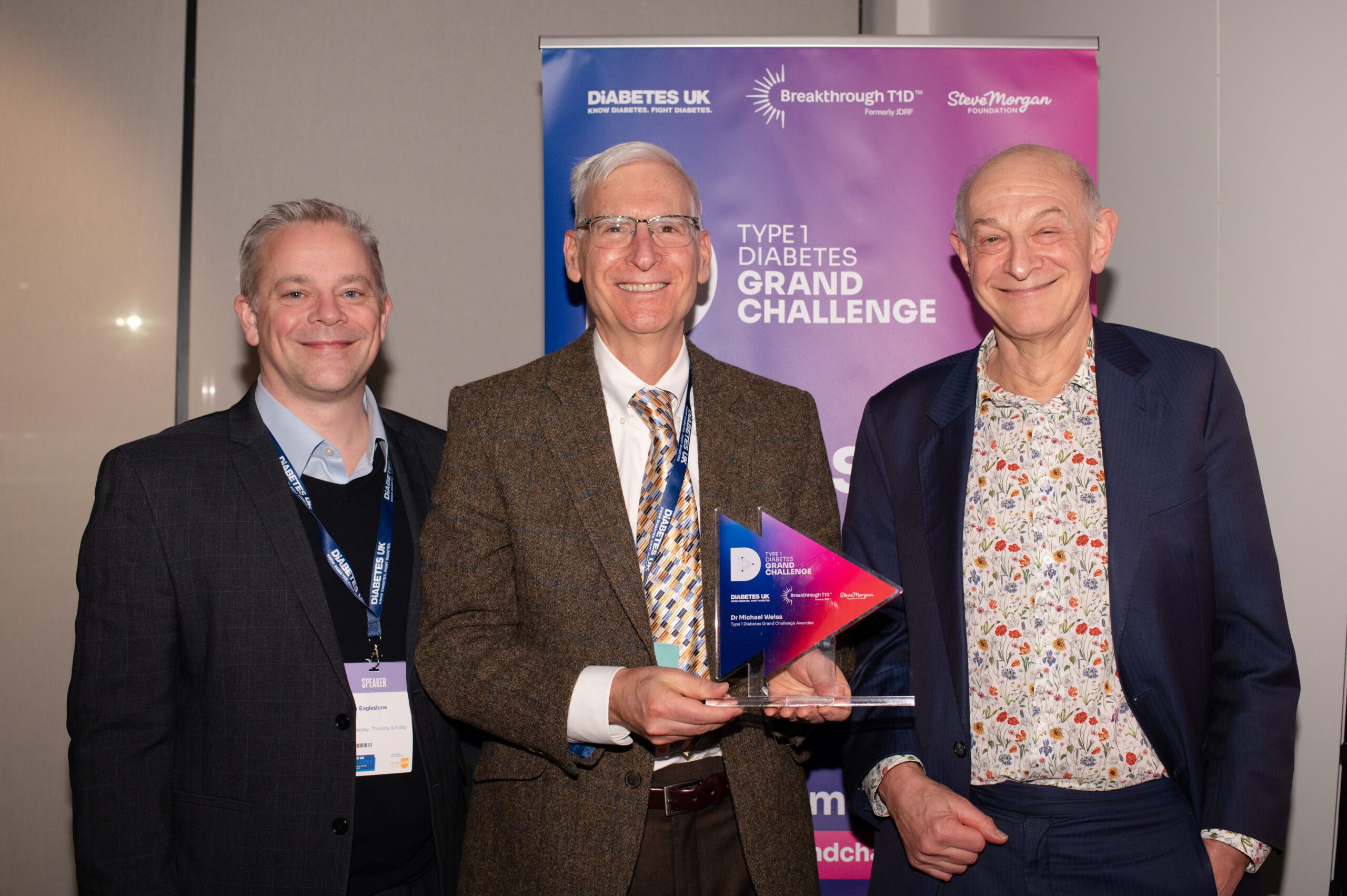
Researchers funded by the Type 1 Diabetes Grand Challenge have developed a new insulin–glucagon molecule, which could reduce dangerous drops in blood glucose, known as hypoglycaemia. For people living with type 1 diabetes, where hypoglycaemia is a constant risk, this breakthrough has the potential to make daily management safer and more reliable.
In type 1 diabetes (T1D), a person’s body doesn’t produce enough insulin, meaning blood glucose levels will continue to climb if insulin is not given (either by injection or using a pump). Managing blood glucose levels is a constant balancing act for people with type 1 diabetes, between administering the correct amount of insulin and their blood glucose going too high or too low and dealing with the consequences of this. If blood glucose goes too high, this can cause a potentially fatal complication called diabetic ketoacidosis, where a person’s blood becomes too acidic. Sustained high blood glucose levels can damage the eyes, feet, heart and kidneys. If blood glucose levels drop dangerously low it can lead to seizures, coma, and can sometimes be fatal.
Findings by US-based researchers, published in ACS Pharmacology and Translational Science, show success in engineering a product that combines both glucagon and insulin in the same molecule. Insulin is the hormone responsible for reducing blood sugars by enabling cells to use glucose for energy, and glucagon is the hormone responsible for a raising in blood glucose. This molecule was then able to take advantage of the body’s built in ‘on/off switch’ in the liver. The liver naturally responds more to insulin when glucose is high and more to glucagon when glucose is low. When blood glucose is high, the insulin part of the molecule is active, lowering blood glucose like regular insulin. However, when blood glucose is low, the glucagon part is active, signalling to the liver to release glucose and preventing low blood sugar episodes (known as hypoglycaemia or hypo).
The research team tested the new insulin in rats, with positive initial results. The insulin behaved as intended: lowered blood glucose when high and helped raise blood glucose when low – unlike regular insulin. It also reduced the need for emergency glucose injections in the rats during hypoglycaemia.
The two parts of the molecule (insulin and glucagon) worked independently but in balance, just like separate hormones. The promising results indicate that the new molecule could help lower the chance of hypoglycaemia in people with type 1 diabetes.
The study also showed that the new form of insulin stayed stable for weeks without the need for refrigeration before opening, giving it a longer shelf life than expected. This makes it more reliable for people with T1D and easier for manufacturers to produce, store, and transport.
Low blood glucose is as unpleasant side effect of type 1 diabetes. It normally occurs due to an imbalance between insulin dose, food intake and physical activity. Having a hypo is something which, if possible, all people with type 1 diabetes would want to avoid. It can be dangerous as when blood glucose is low as the brain is deprived of its energy source – glucose. This leads to a sensation of weakness, dizziness or blurred vision, alongside feeling angry or confused. There are many other potential symptoms.
This research has been funded by the Type 1 Diabetes Grand Challenge, a partnership between Breakthrough T1D, Diabetes UK and the Steve Morgan Foundation.
Michael Weiss, distinguished Professor in the Department of Biochemistry & Molecular Biology, Indiana University School of Medicine, said:
“For the past century, coping with hypoglycaemia (the lows) has been an ever-present challenge in type 1 diabetes. This has made creating glucose-responsive insulins (smart insulins) a major goal. Our approach simplifies such design by exploiting an endogenous ‘smart’ switch in the liver, how the body naturally adjusts relative hormonal responses based on whether the blood glucose level is high or low: Too high, insulin wins; too low, glucagon wins!”
Michael Weiss was also supported by lab partner and colleague at Yale, Associate Professor Raimund Herzog, who was part of the team proposal and oversaw the animal testing.
Rachel Connor, Director of Research Partnerships at Breakthrough T1D UK, said:
“This new development in novel insulins research hold exciting promise for people with T1D. Avoiding low blood glucose is a constant balancing act for people with type 1 diabetes, as so many factors can combine to affect blood glucose levels. An insulin offering protection from hypoglycaemia could have a profound impact on the mental burden of living with T1D. With funding from the Type 1 Diabetes Grand Challenge, we’re excited to be driving innovations as fast as possible toward testing with people who live with T1D.”
Dr Elizabeth Robertson, Director of Research and Clinical at Diabetes UK, said:
“The Type 1 Diabetes Grand Challenge is committed to supporting innovation that meets the needs of people living with type 1 diabetes. These positive results are an exciting step towards next-generation insulins that could ease the burden of daily management with insulin therapy. We look forward to seeing this promising research advance into human studies and, ultimately, improve the lives of everyone who depends on insulin therapy.”
With new research such as this, there is a possibility to reduce the number of hypos, which would be safer for all people living with type 1 diabetes. This research is in its early stages, with many more steps to occur before it will be made available to the public. The eventual aim is to create two different types of insulin; a longer lasting version for use once a week, and a short acting version for use in insulin pumps.
Funding boost enables UK researchers to access European type 1 diabetes cell therapy collaboration
September 23, 2025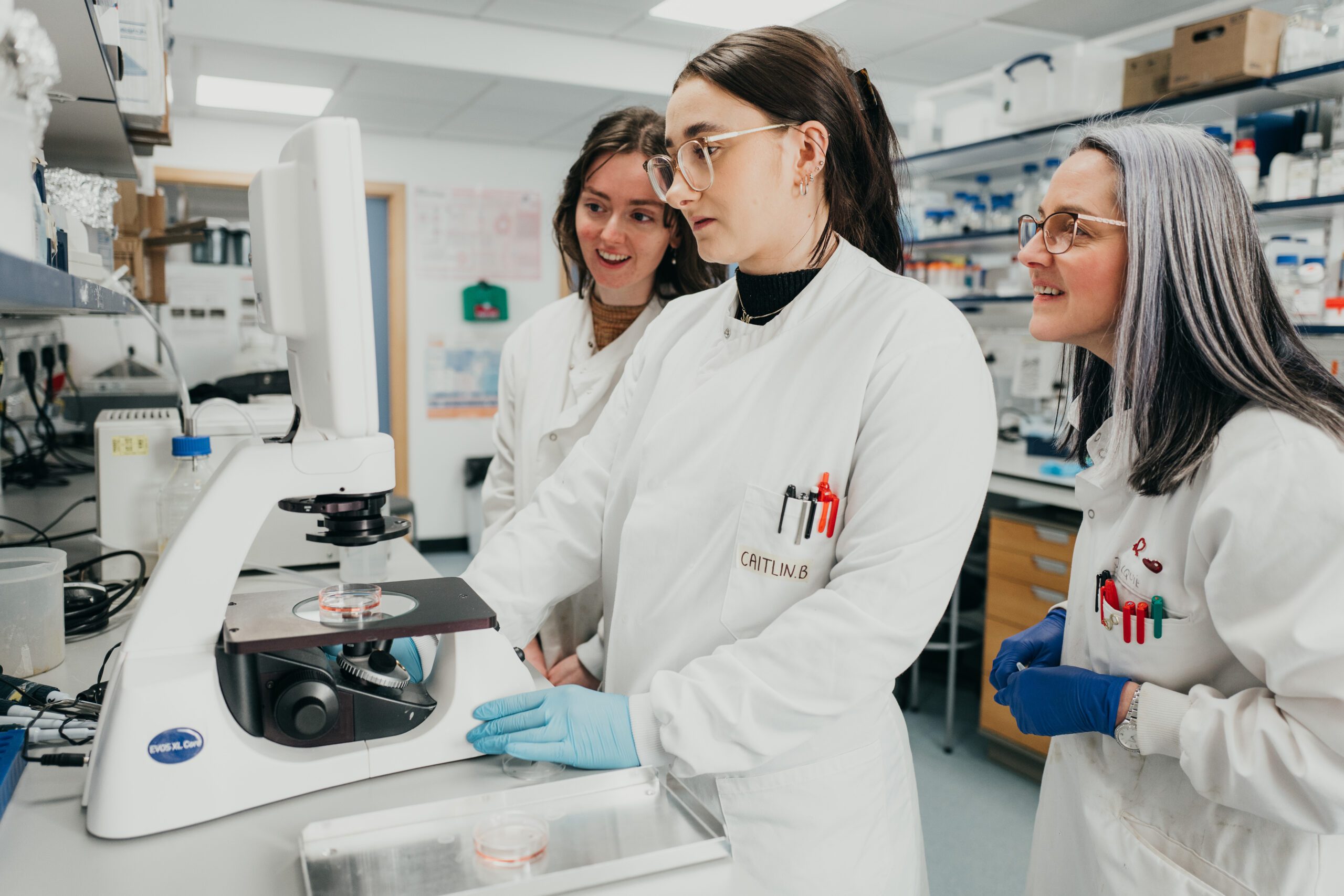
UK researchers will be able to collaborate with European experts on a major funding initiative to develop cell therapies for type 1 diabetes, thanks to funding from the Type 1 Diabetes Grand Challenge in partnership with UK Research and Innovation (UKRI).
Earlier this year, the UK Government confirmed that UK researchers would be unable to access EU funding for four European Innovation Health Initiative (IHI) call topics – part of the Horizon Europe Framework Programme – due to budget timing issues.
This included the high-profile ‘Leveraging Europe’s Expertise to Accelerate Cell Therapy for Type 1 Diabetes’ call topic, which aims to drive the widespread adoption of beta cell therapy by ensuring its efficacy, accessibility, and integration into healthcare systems.
This risked excluding eligible UK researchers from one of the largest collaborations in the field, potentially leading to duplicated efforts across Europe and slowing progress.
Now, the Grand Challenge will commit up to £2 million over 5 years to ensure UK institutions can participate in the IHI call. The funding will be administered through UKRI.
This investment will mean UK researchers can stay fully embedded in European collaboration and strengthen international knowledge-sharing, to accelerate progress towards life-changing new treatments for people living with type 1 diabetes.
Dr Elizabeth Robertson, Director of Research and Clinical at Diabetes UK, said:
“This funding from the Steve Morgan Foundation will help ensure UK researchers can stay at the forefront of beta cell therapies. It reflects the Type 1 Diabetes Grand Challenge’s determination to act with urgency and to safeguard collaborations, so that people with type 1 diabetes can benefit from life-changing therapies without delay.”
Liam Eaglestone, Chief Executive Officer of the Steve Morgan Foundation, said:
“At the Steve Morgan Foundation, we are committed to transforming the lives of people with type 1 diabetes. When it became clear that additional support was needed for UK researchers to join this important European collaboration, we acted quickly with our Type 1 Diabetes Grand Challenge partners to help make that possible. This funding will ensure UK expertise continues to play a central role in international efforts to advance cell therapies, bringing us closer to life-changing treatments for everyone affected by type 1 diabetes.”
Rachel Connor, Director of Research Partnerships at Breakthrough T1D UK, said:
“We believe that curing type 1 diabetes will take a truly global effort. That’s why we’re committed to ensuring UK researchers can contribute to and benefit from international collaborations like this one. By unlocking access to world-class partnerships, we’re accelerating progress towards breakthrough therapies and keeping the UK firmly embedded in the global push for cure.”
Professor Christopher Smith, the International Champion of UKRI and the Executive Chair of the Arts and Humanities Research Council (ARHC), said:
“This funding enables UK researchers to remain engaged in a major European initiative advancing cell therapies for type 1 diabetes. It reflects UKRI’s commitment to international partnerships that accelerate scientific progress and deliver real-world impact. This collaboration will support UK institutions to drive forward transformative treatments that could change lives across the UK and beyond.”
The first-stage application deadline for the call is 9 October.
Further Information
- Please note that: (1) the UK funding will be administered by UKRI in parallel to (but separate from) the UK Horizon Europe Guarantee and will use largely similar rules; and (2) there will be a requirement for UK organisations to submit a short form with basic information to UKRI and Diabetes UK.
- Potential UK applicants (or their collaborators) should contact Jo Frost – the UK National Contact Point (NCP) for Horizon Europe Health – for further details as soon as possible at ncp-health@iuk.ukri.org
- Mirroring the UKRI Horizon Europe Guarantee process, applicants will be bound by: the IHI project’s Consortium Agreement; relevant clauses in the IHI Grant Agreement; and the terms and conditions of the UKRI Horizon Grant Offer Letter.
In addition, for this call and as part of the Diabetes UK funding conditions, applicants will also be required to agree to Diabetes UK’s standard revenue share agreement in relation to future possible use of IP. Applicants are advised to review section 3 of the Diabetes UK Revenue Share Agreement.
We would advise applicants to share the Diabetes UK standard revenue agreement with their international consortium straight away and ensure that the consortium is aware of the content of the agreement. - Further information on IHI Call 11 Topic 4 “Leveraging Europe’s expertise to accelerate cell therapy for type 1 diabetes” is available on the IHI website.
The Grand Challenge partners with the NIHR to establish a UK-wide Type 1 Diabetes Cell Therapy Clinical Trials Network
August 4, 2025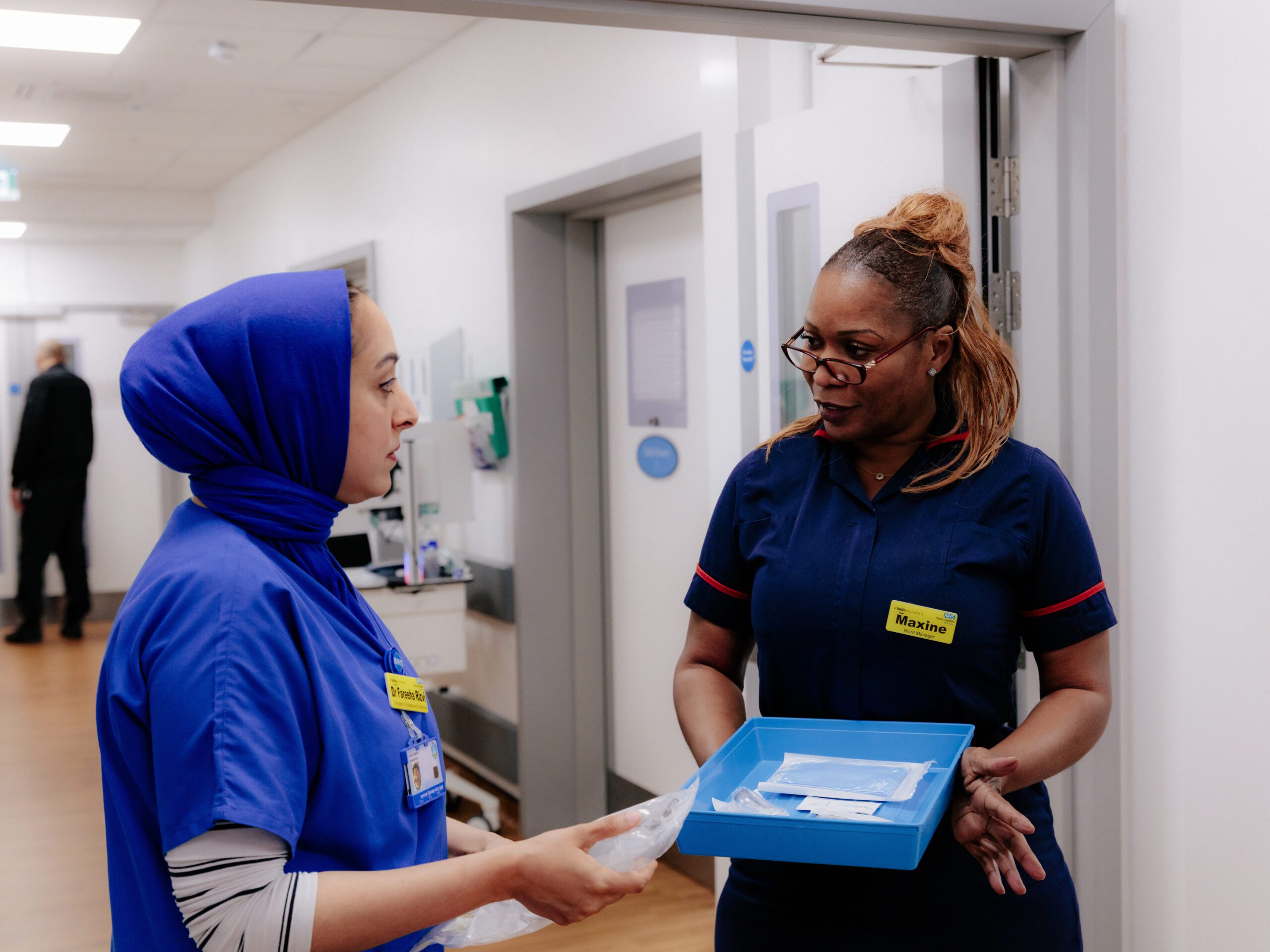
We’re excited to announce that we’re investing £5 million over the next five years to establish a UK-wide Type 1 Diabetes Cell Therapy Clinical Trials Network, in partnership with the National Institute for Health and Care Research (NIHR).
This bold initiative will secure the UK’s position as a global leader in type 1 diabetes research, and ensure people living with the condition gain access to the latest cutting-edge treatments as early as possible.
With momentum from the Grand Challenge, the pace of innovation in cell therapies for type 1 diabetes is rapidly accelerating. Several groundbreaking treatments are now advancing into clinical trials, offering new hope for transformative cures. Expanding the UK’s capacity and capability to deliver these therapies into clinical practice through a nationally coordinated approach is now critical.
Supported by the NIHR’s clinical research infrastructure to guarantee sustainability and lasting impact, the Network will pinpoint and address the unique challenges of type 1 diabetes cell therapy trials, while enhancing and integrating existing resources. By leveraging expertise, infrastructure, and data from across the UK, it will provide a world-class, globally attractive platform for type 1 diabetes cell therapy clinical trials.
The Network will connect existing type 1 diabetes networks and bring together leaders from across NIHR’s Biomedical Research Centres (BRCs) and Clinical Research Facilities (CRFs). It will also draw on knowledge beyond type 1 diabetes, tapping into cross-disciplinary experience from areas including oncology and organ transplantation.
Initial focus areas for the Network include:
- patient cohorts and phenotyping;
- patient recruitment;
- involvement of people affected by type 1 diabetes;
- clinical trial delivery models.
A Task and Finish Group, chaired by Professor Simon Heller, an internationally recognised diabetes expert and Chair of the Grand Challenge Scientific Advisory Panels, and comprising clinical leaders and people with lived experience of type 1 diabetes, will guide the Network’s strategy and implementation.
To accelerate progress, a senior NIHR expert will be embedded within the Grand Challenge team, and a new funding call will launch to strengthen infrastructure for delivering beta cell therapy trials across the UK. Further details will be shared in late 2025.
Dr Elizabeth Robertson, Director of Research and Clinical at Diabetes UK, said:
“We’re delighted to partner with the NIHR to establish the UK’s first Type 1 Diabetes Cell Therapy Clinical Trials Network, aimed at delivering breakthrough, potentially curative therapies. This initiative captures the very essence of the Grand Challenge: ambitious partnerships, cutting-edge innovation, and an unwavering focus on improving the lives of people with type 1 diabetes as quickly as possible. It’s a strategic leap toward making cell therapies a real-world treatment option, while reinforcing the UK’s position as a global leader in clinical research.”
Professor Marian Knight, Scientific Director for NIHR Infrastructure, said:
“This new clinical trials network will bring together world-leading expertise in type 1 diabetes with the power of the NIHR’s infrastructure to accelerate progress towards the development of cutting-edge cell therapies. Putting patients at the heart of the new research will ensure these new treatments are rapidly transitioned from bench to bedside, improving the lives and futures of people with diabetes.”
Liam Eaglestone, Chief Executive Officer of the Steve Morgan Foundation:
“We’re proud to fund the work of the Type 1 Diabetes Grand Challenge, supported by NIHR. By bringing together the best people and organisations into diabetes research, this new network will speed up the development of life-changing treatments, bringing us closer to a future without type 1 diabetes”
Viral triggers, ticks to tackle the immune system and a smart coat for insulin: Latest type 1 diabetes research
May 27, 2025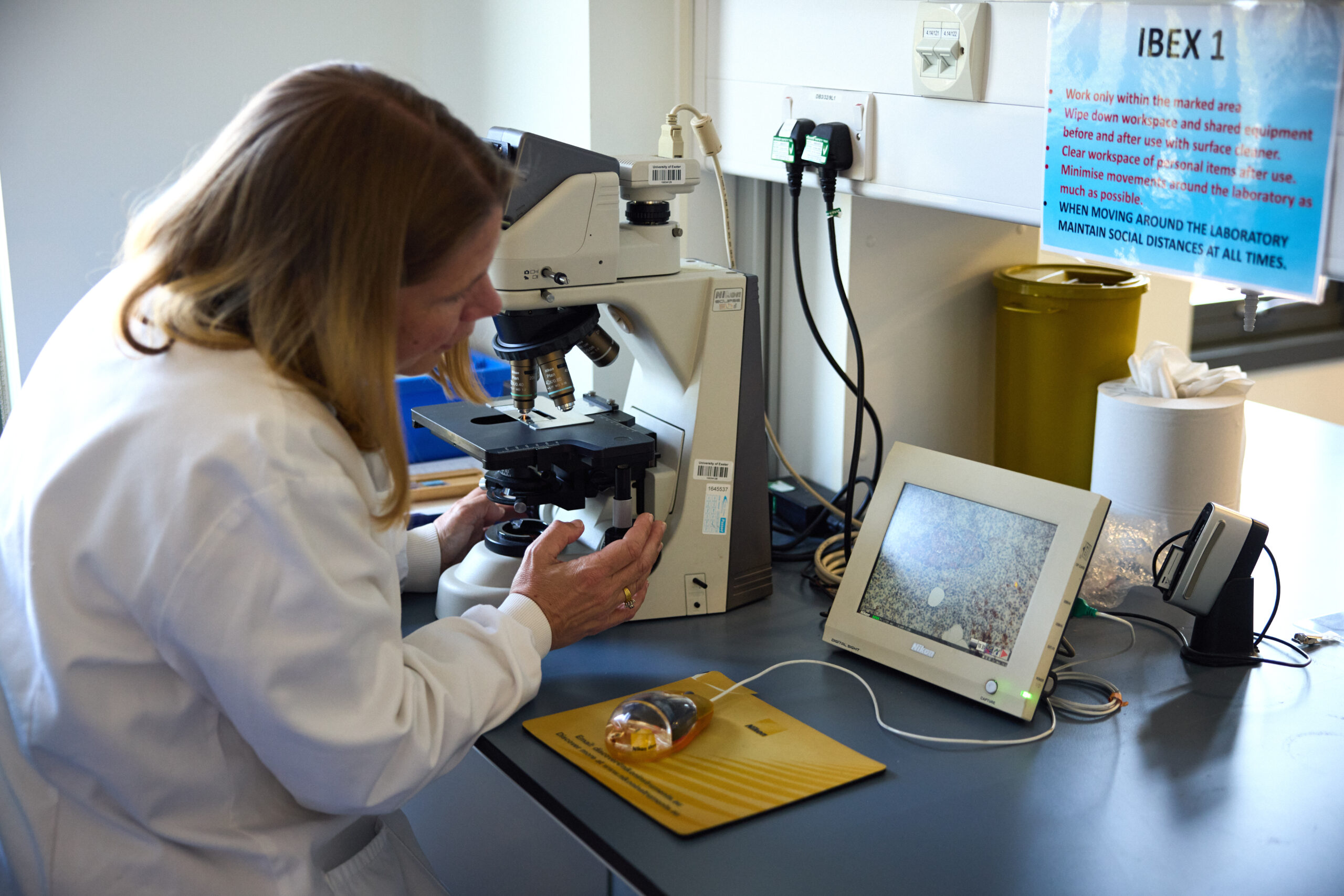
At the Type 1 Diabetes Grand Challenge, we support cutting-edge research aimed at bringing us closer to better treatments, and potentially, a cure. The research teams we fund are leaders in the field and their latest discoveries, highlighted here, are contributing to global efforts to transform the treatment of type 1 diabetes.
Connection between a common virus and type 1 diabetes
The development of type 1 diabetes is caused by a complex interplay of genetic and environmental factors, which trigger the immune system to turn on and destroy insulin-producing beta cells. The Type 1 Diabetes Grand Challenge is investing in research to learn more about precisely what goes wrong and how this process unfolds.
An international research team, including our Senior Research Fellow Professor Sarah Richardson, has just published the strongest evidence to date that enteroviruses play a role in the development of type 1 diabetes.
They studied pancreas samples from nearly 200 donors to check for signs of enterovirus infections. These included samples from people with and without type 1 diabetes, as well as individuals who had type 1 diabetes autoantibodies – early immune warning signals that indicate a high risk of developing the condition in the future.
They reported that signs of enterovirus infection were most common in people with type 1 diabetes who still had some functioning beta cells. Infections were also present in people with autoantibodies, but much less common in those without diabetes or in people with type 1 whose beta cells had already been completely destroyed.
A key finding was the presence of a protein made by the enterovirus, called VP1. The researchers found VP1 was strongly linked to high levels of HLA class I molecules. These are markers of an early immune system response in the pancreas. This is the first time these viral and immune markers have been found together – including in the early stages of type 1 before a diagnosis.
These findings offer the strongest evidence to date that enteroviruses may trigger or accelerate the onset of beta cell destruction in early type 1 diabetes. A clearer understanding of their role could lead to new approaches that target the immune processes they influence — potentially slowing or even preventing type 1.
‘Ticking’ beta cell protection
One part of a solution to curing type 1 diabetes is to transplant beta cells, either donated or grown in labs, into people with type 1 so they could produce their own insulin again. However, the immune system is primed to attack the new cells too. This happens partly because the transplanted cells release chemokines—chemical signals that attract immune cells. Blocking these signals is difficult, as there are many different types.
Scientists have discovered that ticks produce proteins called evasins that can block several of these signals at once. Professor Shoumo Bhattacharya’s team has studied these evasin proteins and identified the specific peptides that have this powerful blocking ability. They’ve established a new method that allows them to test many versions of these peptides rapidly, and pinpointed those that work best at calming the immune response.
Published in Communications Biology, these innovative findings lay the groundwork for Professors Shoumo Bhattacharya and David Hodson’s Grand Challenge project. They aim to use these peptides to help protect new beta cells from immune attack after being transplanted. This could create a safer alternative to immunosuppressive drugs and improve the success of beta cell therapies for type 1 diabetes.
Giving insulin a smart coat
Professor Zhen Gu’s team at Zhejiang University in China has developed a new insulin delivery system, called i-crystal, as reported in their latest publication in Nature Nanotechnology.
Designed to help people with type 1 diabetes keep blood sugar levels within target range, the system uses specially coated insulin crystals that release insulin slowly and steadily. The coating is a unique membrane that enables the crystals to respond precisely to changes in blood sugar and ketone levels. This means insulin is only released when blood sugar levels rise and stops when it drops, helping people with type 1 avoid highs (hypers) and lows (hypos).
Early tests show that i-crystal could help regulate blood sugar levels for over a month in mice after just one injection, and for more than three weeks in minipigs after five daily doses. This suggests this delivery system could reduce the need for frequent injections and make daily diabetes management easier.
If successful, i-crystal could offer a safer, longer-lasting, and more adaptable form of insulin therapy for people living with type 1 diabetes.
The Type 1 Diabetes Grand Challenge makes waves at DUKPC
The Type 1 Diabetes Grand Challenge took centre stage at this year’s Diabetes UK Professional Conference, uniting researchers and people affected by type 1 diabetes to share their expertise and celebrate progress with the wider diabetes community.
March 14, 2025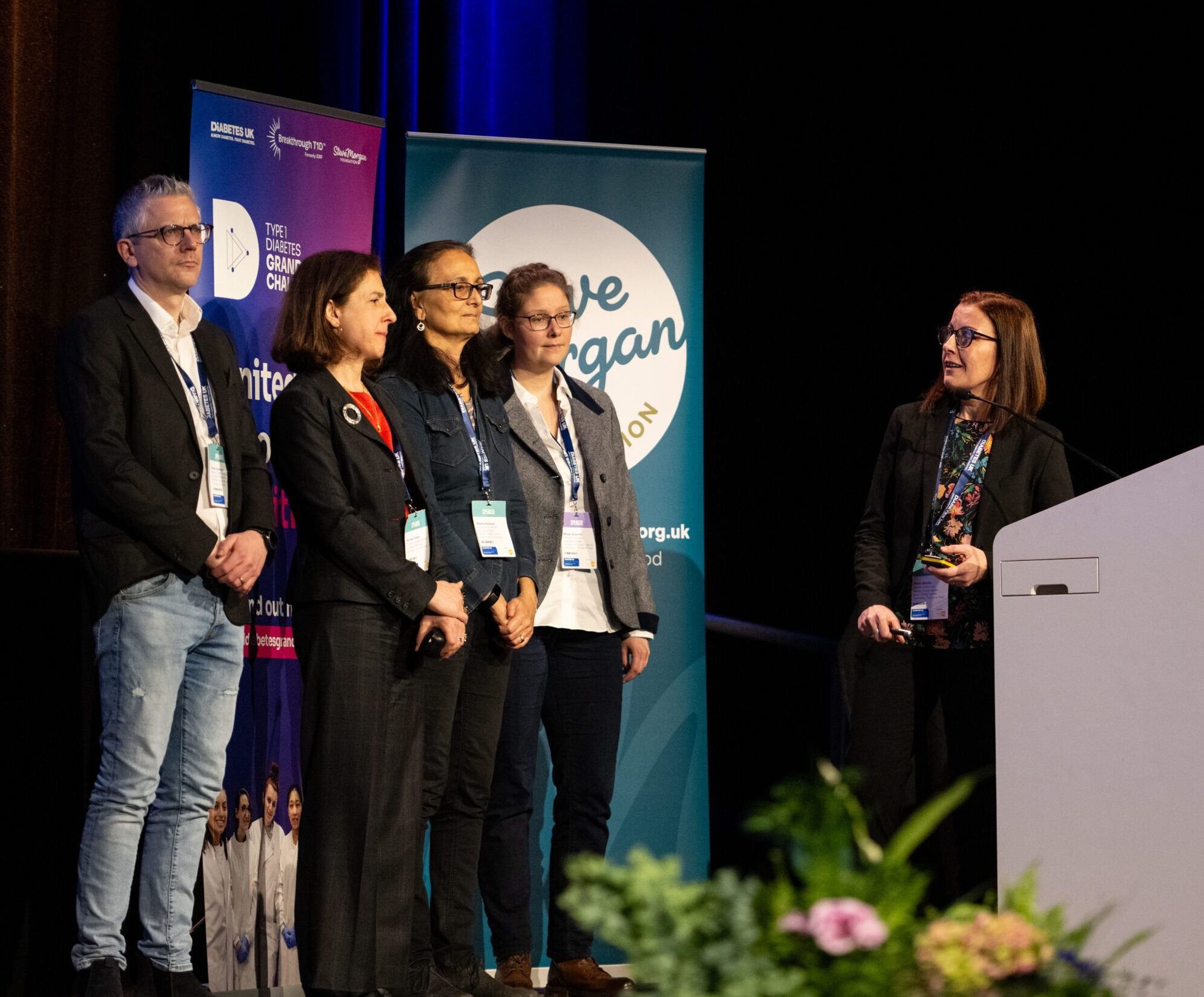
The Type 1 Diabetes Grand Challenge took centre stage at this year’s Diabetes UK Professional Conference, uniting researchers and people affected by type 1 diabetes to share their expertise and celebrate progress with the wider diabetes community.
Our community in the spotlight
The main Grand Challenge session was a powerful showcase of our ever-growing community, featuring 13 new projects we’ve funded in the last year.
The session began with updates from researchers working to build better beta cells in the lab from stem cells, protect new cells during and after transplantation, and regrow beta cells in people with type 1 diabetes.
Later on in the conference, we heard more about islet transplantation, using cells from donor pancreases. Prof Shareen Forbes discussed the potential of microparticle drug delivery to protect transplanted islets and improve their survival. And we were joined by Dr Vicky Salem who highlighted innovations in biomaterials that could transform islet transplantation.
Our immune insights project leads shared exciting progress on targeting the type 1 immune system attack in safer and more effective ways. Dr James Pearson revealed that some immune cells follow a daily rhythm, and that’s why his project is testing if immunotherapies timed to these cycles will improve their effectiveness.
We also welcomed Profs Michael Weiss, Matthew Webber and Zhiqiang Cao, who discussed their eye-opening ideas to develop novel insulins that could act more quickly and precisely, ultimately reducing the burden of type 1 diabetes management.
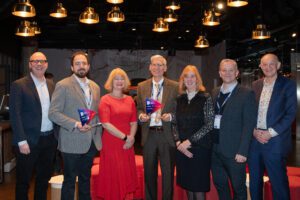
Picture of Profs Michael Weiss, Matthew Webber accepting their awards; credit: © Julie Broadfoot
You can find more details about each project presented at DUKPC on our funded projects page.
Lived experience at the heart of research
A dedicated session at DUKPC highlighted how the quality and impact of Grand Challenge research is being enhanced by meaningfully involving people with lived experience of type 1.
Heather Robinson, a Together Type 1 young leader, shared striking statistics on the difficulties of transitioning from paediatric to adult diabetes care, underscoring the need for greater involvement from those directly affected.
Dr James Pearson echoed this, sharing how the challenge of recruiting young adults with type 1 for research led him to involve them more actively through the Cardiff Diabetes Innovation Committee. Committee members reflected on how this engagement deepened their understanding of type 1 diabetes and ensured research truly benefits those who need it most.
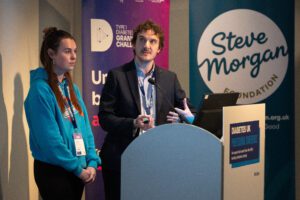
Picture of Dr James Pearson and Lilly from the Cardiff Diabetes Innovation Committe; credit: © Philippa Gedge Photography
Recognising the importance of lived experience in research, Professor Sean Dinneen spoke about working with young adults with type 1 to identify gaps in care and improve treatments, while Dr O’Donnell showcased his project co-developing user-led technology that prioritises real-life experiences and emotional well-being.
Amelia Burke, a glass artist from Wales and mum of Ruby who lives with type 1, emphasised that involvement must be accessible and approachable. Her interactions with Grand Challenge researchers inspired her to use artistic methods to represent her daughter’s experience and raise awareness about beta cell therapies.
Heather shared her experience at the conference with us:
“Getting to experience DUKPC from multiple perspectives was such a unique and unforgettable opportunity. From interviewing researchers, speaking on a panel, meeting other Young Leaders from the Together Type 1 program and presenting in the Grand Challenge Patient and Public Involvement session, it was a jam-packed few days! Being able to watch the involvement of experts by experience increase over the past few years has been brilliant, and with the collaboration of Steve Morgan Foundation, Diabetes UK and Breakthrough T1D has only developed this. Speaking with researchers and experts by experience brought such a broad range of viewpoints and I’m so excited for the future of patient-led diabetes research and healthcare.”
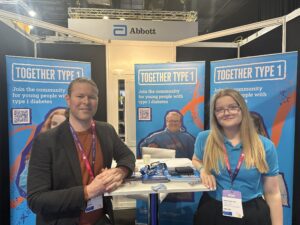
Picture of Heather with Dr Craig Beall at DUKPC
Bringing research to reality
For research to truly make an impact, scientific breakthroughs must be translated into real-world solutions. And that’s exactly what we’re aiming to achieve through the Grand Challenge— accelerating great ideas to change the lives of those affected by type 1 diabetes. As part of this, we hosted a ‘Top Tips on Commercialisation’ session, bringing together experts in research funding, policy, and entrepreneurship to share practical advice on turning research into real-world impact. This is just the beginning —throughout this year we’ll continue to support our community in in moving innovations from the lab into people’s lives.
Dr Andy Chapman, CEO and Co-Founder of Carbometrics says:
“Thank you to Type 1 Diabetes Grand Challenge for inviting me to speak at the Diabetes UK Professional Conference 2025 in Glasgow. It was a privilege to join such an esteemed panel to discuss the challenges and future of commercialisation in diabetes technology, and connect with fellow innovators in this space.”
Dr Bethany Cragoe, Charity Business Manager of LifeArc, says:
“Charities are crucial in getting research to patients by leveraging the expertise of many stakeholders including patients, scientists, clinicians, and industry partners. Technology transfer is key in this process, and early engagement with technology transfer offices helps develop effective intellectual property strategies and potential routes to patient benefit.
“Researchers should understand the translational pathway and plan early to ensure their work benefits patients. Building strong networks with industry and funders is key to success in this journey. Organisations and initiatives such as Knowledge Exchange UK, Innovate UK and Association of Technology Transfer Professionals can support this. All these elements must come together to ensure that the funded research outputs are able to realise their maximum potential for patient benefit.”
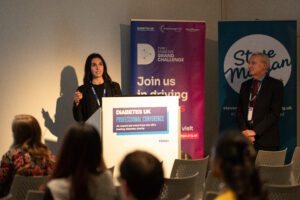
Picture of Dr Bethany Cragoe speaking at the ‘Top Tips on Commercialisation’ credit: © Philippa Gedge Photography
New funding available to boost beta cell research in the UK
December 20, 2024
We’re launching a new funding call to address the limited availability of stem cell-derived beta cells for research purposes.
The aim is to facilitate more high-quality research into beta cell therapies, speeding up progress towards a cure for type 1 diabetes.
To achieve this, we’ve partnered with the Advanced Regenerative Manufacturing Institute (ARMI), the US leading organisation in manufacturing cells, tissues and organs.
Funding is available for UK-based researchers to test if stem cell-derived beta cells produced by ARMI can survive shipment from the US to the UK. And if they can, whether they work as expected in both lab studies and living organisms.
We’re inviting UK experts with a track record of producing and testing stem cell-derived beta cells to apply for funding to test ARMI’s beta cells. Funding is available for up to three sites across the UK.
Successful researchers will also have the opportunity to directly compare ARMI’s beta cells with their own lab-made beta cells. This may help them to improve their own production process and identify the most effective product for wider rollout.
The hope is that it will enable the development of a reliable supply of high-quality, pre-made stem cell-derived beta cells for use by UK scientists. By saving researchers time and ensuring consistency across studies, this initiative is expected to accelerate the development of new beta cell replacement therapies.
Apply for funding
Details about the call can be found here. You’ll need to submit your application by 31 January 2025.
If you’re interested in applying, we strongly encourage you to attend our funding call webinar on 8 January 2025 at 14:00 GMT and reach out to the T1DGC Research Funding Team to discuss the opportunity further (smfgrandchallenge@diabetes.org.uk).
The Advanced Regenerative Manufacturing Institute (ARMI | BioFabUSA) said:
“ARMI is proud to partner with the Type 1 Diabetes Grand Challenge to advance beta cell research. By providing high-quality, stem cell-derived beta cells for validation, we aim to accelerate breakthroughs in type 1 diabetes treatment and improve the scalability of regenerative therapies. This initiative represents a critical step in bridging global efforts to bring innovative solutions to patients.”
Professor Matthias Hebrok, Vice Chair of the Type 1 Diabetes Grand Challenge Scientific Advisory Panel, said:
“Testing stem cell derived islets produced by a foundry for their functional properties upon being sent to the UK is critical to ensure high quality tissues will be available to accelerate research in type 1 diabetes.”
Gaining pace towards a cure – a round-up of 2024
December 16, 2024
The global quest to create better treatments and find ways to prevent and cure type 1 diabetes continued to gather pace in 2024. At the Type 1 Diabetes Grand Challenge, we kickstarted 10 pioneering research studies across the UK and globally, expanding our portfolio of funded science to 19 projects, involving 161 researchers in 47 institutions across 8 countries, and shared our mission with thousands affected by the condition.
Here, we round-up the highlights of the year.
Science fiction into fact
The Type 1 Diabetes Grand Challenge is taking the quest to cure type 1 diabetes to a new level by emboldening scientists to be innovative and disruptive, leading to totally new avenues of discovery. That’s why some of the projects funded in 2024 read like sci-fi storylines, from investigating insulin-producing brain cells to copying the immune evasion tactics used by ticks.
This year, we invested over £2 million into four new research projects to tackle the root causes of type 1 and replace the insulin-making beta cells lost in type 1. Four research teams are now hard at work on these innovative ideas, and others.
Dr Elizabeth Robertson, Director of Research at Diabetes UK, said: “These high-risk, high-reward, innovative projects exemplify the transformative potential of the research funded by the Type 1 Diabetes Grand Challenge. By driving forward bold, cutting-edge approaches, we’re stepping closer to revolutionising the way type 1 diabetes is treated and improving the lives of those affected by the condition.”
One of the newly funded researchers, Dr Craig Beall, summed up the ambition: “The moonshot we’re aiming for is a cure that frees people with type 1 diabetes from insulin injections and immunosuppression.”
Innovating insulin
For over a century, type 1 diabetes has been treated with insulin. It’s a life-saving treatment, but it’s also a very blunt instrument, unable adapt to the wide-ranging factors that affect blood glucose levels.
In August 2024, we invested over £2.7 million into six projects to develop ‘smart’ insulins that could transform the treatment of type 1. The six research teams are aiming to create next-generation insulins that can respond to changing blood glucose levels, ultrafast-acting insulins and a combination drug that can both raise and reduce glucose levels.
Rachel Connor, Director of Research Partnerships at Breakthrough T1D, said: “Managing glucose levels with insulin is really tough, and it’s time for science to find ways to lift that burden. By imagining a world where insulins can respond to changing glucose levels in real-time, we hope these six projects will help to create that new reality, relieving people with type 1 of the relentless demands that living with this condition places on them today.”
On tour with the Grand Challenge
People affected by type 1 diabetes are at the heart of the Grand Challenge. It was born out of Steve and Sally Morgan’s family experience of type 1, and we actively involve those living with type 1 diabetes at every stage of the research process — from shaping funding decisions to playing a crucial role in supporting researchers in delivering their projects.
So, in 2024, we took the Grand Challenge into the community, talking to thousands of people who understand the day-to-day struggle of type 1 and the importance of our mission to revolutionise treatments and find cures.
We were delighted to join DiabetesChat’s fifth virtual research event, and to attend the Talking About Diabetes (TAD) event in Liverpool. At TAD 2024, Liam Eaglestone, CEO of the Steve Morgan Foundation, and his son Jack, took to the stage to talk about their experiences of living with type 1. Liam said: “[Diabetes] Technology is great – but it is not a cure. The Grand Challenge is seeking that cure, by bringing together some of the best and brightest brains in the type 1 research community.”
We were joined at the Diabetes UK Professional Conference by seven Young Leaders from the Together Type 1 programme. These inspiring young advocates interviewed Grand Challenge researchers and shared their experiences of living with type 1 with scientists and healthcare professionals. And in November, some of the Grand Challenge team visited Northern Ireland to give the Together Type 1 Young Leaders there an update on the latest research developments.
Young Leader Elisa Featherstone said: “Hearing about this research programme made me consider, for the first time, the reality of not having type 1 diabetes for the rest of my life. A cure may be sooner than we think, and it may well be because of the Grand Challenge!”
Progress through collaboration
Collaboration is key to progress, a principle exemplified at our first Beta Cell and Root Causes symposium held in November 2024. The symposium brought together hundreds of researchers from different strands of the Grand Challenge and people living with type 1 diabetes.
Dr Mirjam Eiswirth, who lives with type 1 diabetes and wrote a summary of the symposium, said: “Personally, I am very excited about the progress we’ll make through these research projects. They have the potential to change the lives of millions of people with type 1 diabetes for the better.”
Simon Heller, Chair of the Scientific Advisory Panel, said: “We’re moving faster than I thought we would. The willingness of scientists to collaborate shows what can be achieved when we work together.”
At the symposium, the first recipients of Grand Challenge funding, our Senior Research Fellows Professor Sarah Richardson, Dr James Cantley and Dr Victoria Salem, highlighted the remarkable progress their projects have made over the past year. Early career researchers in Dr Cantley’s lab have taken pancreatic cells from mice and regrown them into beta cells – they will now search for drugs that can support this process. Professor Richardson’s team has found that small clusters of beta cells, common in young children, are more vulnerable to the autoimmune attack. Lastly, researchers in Dr Salem’s team is engineering a device that can protect lab-grown beta cells from the immune attack while providing nutrients via a blood supply. We’re excited to track the the trio’s progress in 2025!
Looking ahead with hope
The Type 1 Diabetes Grand Challenge will continue to build momentum in 2025. We’ll begin to see early outcomes from our first projects and will invest in more disruptive and collaborative science.
Building on the conversations sparked at the symposium, we look forward to the Grand Challenge advancing through collaborative working, and we’re excited to continue this progress at the Diabetes UK Professional Conference in February, where Grand Challenge researchers will share ideas and forge new connections.
As Sally and Steve Morgan said: “It’s about doing things differently, it’s about taking risks, but above all it’s about collaboration. Let’s work as a team.”
Four innovative projects receive funding from the Type 1 Diabetes Grand Challenge
October 22, 2024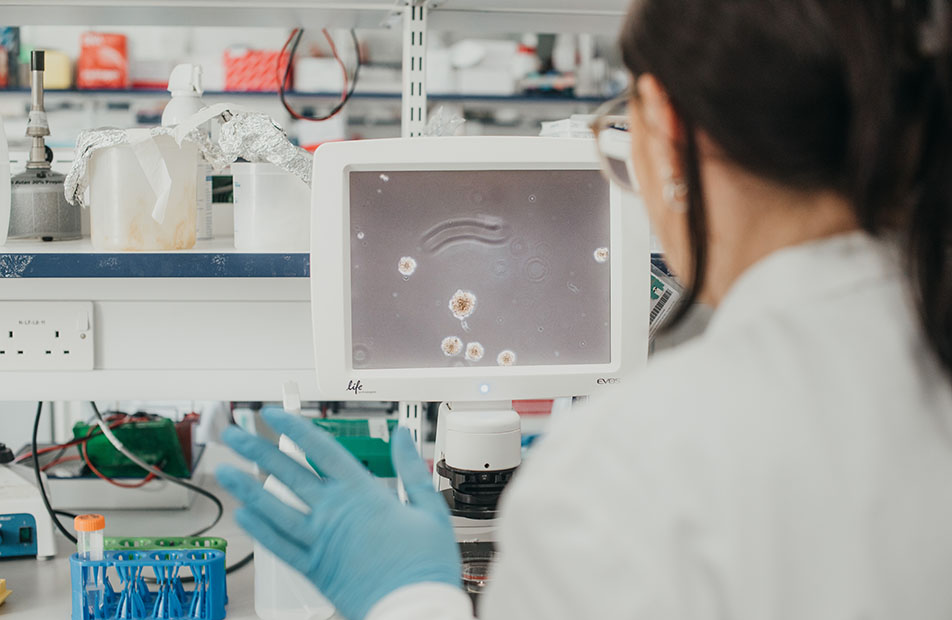
We’re investing over £2 million into four new research projects exploring creative approaches to improve beta cell therapies and tackle immune system dysfunction in type 1 diabetes.
The latest batch of cutting-edge projects are now underway thanks to funding from the Grand Challenge. This investment will help research teams across the UK to test their original and potentially groundbreaking ideas on ways to improve the function and survival of insulin-producing beta cells and keep the type 1 immune attack at bay. Together, these pioneering projects offer new hope to improve the lives of people with type 1 diabetes.
Tiny molecules with big potential
Dr Aida Martinez-Sanchez, Dr Prashant Srivastava and their team at Imperial College London, along with Dr Teresa Rodriguez-Calvo at Helmholtz Zentrum Munich, will study how microRNAs – tiny molecules in our cells that switch different genes on and off and change how the cell works – affect the function and survival of beta cells.
Dr Aida Martinez-Sanchez said:
“The complex methodologies we’re developing have the potential to form the basis of future research in other important aspects of beta cell biology, such as how to reduce the risk of transplant rejection, or delay or prevent beta cell destruction in type 1 diabetes.”
Read more about the team’s project.
Insulin on the brain to outsmart type 1
At the University of Exeter, a team led by Dr Craig Beall and Dr Thomas Piers will explore whether a type of brain cell that produces insulin can be used to develop long-lasting, effective beta cell therapies for type 1 diabetes which are resistant to the type 1 immune attack.
Dr Craig Beall said:
“The moonshot we’re aiming for is a cure that frees people with type 1 diabetes from insulin injections and immunosuppression, and this is the next step in that journey.”
Read more about the team’s project.
Developing drugs from bugs – how do beta cells tick?
Tick saliva contains peptides that helps to hide them from their victims’ immune systems. Researchers at the University of Oxford led by Professor Shoumo Bhattacharya and Professor David Hodson will harness these immune system evading peptides to develop beta cell therapies that are protected from the type 1 immune attack. This could transform the way the condition is treated by helping people to make their own insulin again without the need for immunosuppressive drugs.
Professor Shoumo Bhattacharya said:
“Our lab is looking to nature for new ways to treat inflammatory diseases. We aim to develop tick-inspired treatments to help people with type 1 diabetes, which could improve the success of beta cell transplants.”
Read more about the team’s project.
Could an existing medicine reverse the steps that lead to type 1 diabetes?
Professor Eoin McKinney and his team at the University of Cambridge will use genetic insights and powerful machine learning technology to identify and test new drug candidates for type 1 diabetes. The team has created detailed maps of immune cell changes in people at high risk of type 1, identifying specific genetic patterns, called signatures, that are only seen in those who develop the condition. Using these signatures, they now aim to understand the abnormal immune signals that lead to type 1 diabetes and find drugs to counter them, with the aim of preventing the condition from progressing.
Professor Eoin McKinney said:
“By selecting candidate treatments rationally based on a match with type 1 data, we will stand the best possible chance of finding a safe and effective approach to stop the condition with real impact for patients everywhere.”
Read more about the team’s project.
Dr Elizabeth Robertson, Director of Research at Diabetes UK, said:
“These high-risk, high-reward, innovative projects exemplify the transformative potential of the research funded by the Type 1 Diabetes Grand Challenge. By driving forward bold, cutting-edge approaches, we’re stepping closer to revolutionising the way type 1 diabetes is treated and improving the lives of those affected by the condition.”
Rachel Connor, Director of Research Partnerships at Breakthrough T1D UK, said:
“With these new projects the Type 1 Diabetes Grand Challenges is now funding a total of 19 innovative research studies, all driving us closer to transforming life for people type 1 diabetes. Each project takes a unique approach to the three challenges in type 1 diabetes that we’re tackling: replacing beta cells, uncovering the root causes of type 1, and developing the next generation of insulins.”
New ‘smart insulin’ marks promising step forward in type 1 diabetes treatment
October 17, 2024
A new study, published in Nature, has demonstrated that in animal models, a newly developed form of insulin can switch on and off in response to changing blood glucose levels, effectively lowering high glucose levels without causing dangerous hypos.
The new insulin, named NNC2215 was developed by an international team involving companies based in Denmark, the UK, and the Czech Republic as well as the University of Bristol. It features a sophisticated molecular ‘switch’ mechanism made of two parts: a ring-shaped structure and a molecule with a similar shape to glucose called a glucoside. When blood sugar levels are low, the glucoside binds to the ring, keeping the insulin in an inactive, or ‘off’ state to prevent further lowering of blood sugar. As blood glucose rises, the glucoside is replaced by glucose itself, triggering the insulin to shift its shape and become active, helping bring blood sugar levels down to safer ranges.
‘Smart’ insulins such as this one have the potential to be truly transformative in the management of type 1 diabetes. Unlike traditional insulin, which needs to be carefully dosed to avoid hypoglycemia, a ‘smart insulin’ would only activate when needed, making it a safer and more efficient treatment.
New types of insulin like NNC2215 could lead to a significant improvement in quality of life for people living with type 1 diabetes, helping to reduce the constant burden of managing blood sugar levels.
Researchers who developed NNC2215 found it to be as effective as human insulin at lowering blood glucose in rats and pigs. No timeline has been given for the next steps in developing this product or for clinical trials in people with diabetes, but this is a significant step forward in the search for more advanced and reliable treatments for diabetes. This proof of concept highlights how clever chemistry could unlock entirely new options for people with type 1 diabetes.
Dr Tim Heise, Vice Chair of our novel insulins Scientific Advisory Panel, said:
“This elegant study shows that it is feasible to quickly switch insulin action on and off depending on prevailing glucose levels, and to minimise the risk of hypoglycaemia in pigs.
“While this study certainly is important progress, many more steps will have to follow to establish glucose-sensitive insulins as treatment for people with diabetes. Nevertheless, I am confident that the intense research in glucose-sensitive insulins including the developments funded by the Type 1 Diabetes Grand Challenge programme will manage to achieve this goal.”
Rachel Connor, Director of Research Partnerships at Breakthrough T1D in the UK, said:
“It’s exciting to see data on a new form of insulin that can change its structure to switch activity on and off as glucose levels change. This shows us that a future where people with diabetes no longer need to worry about hypos as a result of insulin therapy could be within reach.”
Dr Elizabeth Robertson, Director of Research at Diabetes UK, said:
“This research represents a significant step forward in the global effort to develop the next generation of “smart” insulins. The hope is that these will ease the constant challenge of managing blood sugar highs and lows, and improve the physical and mental health of millions of people worldwide with diabetes who rely on insulin therapy. We’re excited to part of this endeavour through our Type 1 Diabetes Grand Challenge programme.”
The Type 1 Diabetes Grand Challenge is currently funding six research projects aimed at developing new types of insulin. The goal of the research programme is to eventually offer a range of personalised treatment options for people with type 1 diabetes, tailoring therapies to meet each patient’s unique needs. This exciting progress in insulin innovation brings us one step closer to that vision.

